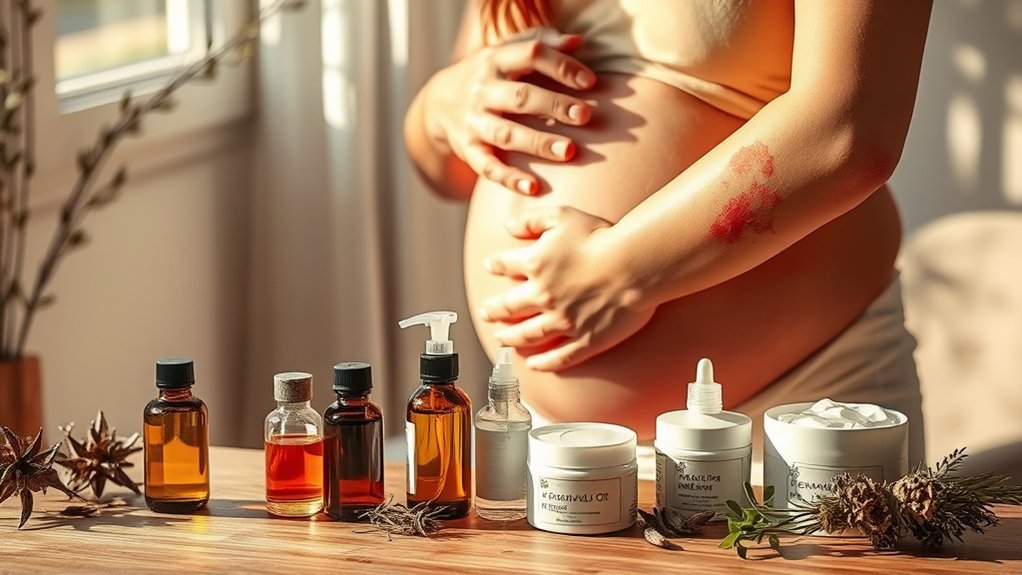During pregnancy, your skin may react in unexpected ways, leading to rashes that can be uncomfortable or concerning. Recognizing the common types of rashes, understanding their symptoms, and identifying triggers can help you manage these issues effectively. Knowing safe treatment options and home remedies is essential for your comfort and health. As you navigate this transformative time, it’s important to be aware of when to seek medical advice. Let’s explore these aspects further.
Common Skin Rashes During Pregnancy
Have you noticed changes in your skin during pregnancy?
It’s common to experience various skin rashes as hormone levels fluctuate and your body adapts to pregnancy. One prevalent rash is pruritic urticarial papules and plaques of pregnancy (PUPPP), characterized by itchy, red bumps that typically appear on the abdomen.
Another common issue is melasma, or the “mask of pregnancy,” which manifests as dark patches on the face due to hormonal changes.
Stretch marks can also develop as your skin stretches, often appearing reddish or purplish initially.
While these rashes are generally harmless, monitoring them is essential. Always consult your healthcare provider for personalized advice and reassurance, ensuring both your comfort and your baby’s health during this transformative time.
Identifying Symptoms and Triggers
How can you differentiate between common skin rashes and those that might require medical attention during pregnancy? Being aware of specific symptoms and triggers can help you identify when to seek care. Look for rashes accompanied by severe itching, swelling, or blistering. Also, be cautious if you experience fever, chills, or respiratory issues.
| Symptom | Action Needed |
|---|---|
| Severe itching | Consult a healthcare provider |
| Blistering or swelling | Seek immediate care |
| Accompanied by fever | Emergency evaluation |
Common triggers include hormonal changes, heat, and certain fabrics. Keeping track of your symptoms and triggers can aid in managing your skin health effectively during this vital time.
Safe Treatment Options
Once you’ve identified the symptoms and triggers of skin rashes during pregnancy, it’s important to contemplate safe treatment options to alleviate discomfort.
To begin, consider using fragrance-free moisturizers, which can soothe irritated skin and provide hydration. Over-the-counter hydrocortisone cream may also be effective for reducing inflammation, but consult your healthcare provider first.
Cold compresses can help ease itching and redness, offering immediate relief. Additionally, wearing loose-fitting, breathable clothing can minimize irritation.
Always prioritize natural, hypoallergenic products in your skincare routine, avoiding harsh chemicals. If symptoms persist or worsen, reach out to your healthcare professional to discuss more tailored treatment options, ensuring both your safety and your baby’s well-being.
Home Remedies for Relief
Finding relief from skin rashes during pregnancy can often be achieved through simple home remedies.
One effective option is applying aloe vera gel, known for its soothing properties, which can help reduce inflammation and itching. You can also try oatmeal baths; colloidal oatmeal mixed in warm water can provide significant relief from irritation.
Consider using cold compresses on affected areas to alleviate discomfort and redness. Additionally, keeping your skin moisturized with fragrance-free creams can prevent dryness and further irritation.
Drinking plenty of water helps maintain skin hydration from the inside out. Finally, wearing loose, breathable clothing can minimize friction and allow your skin to heal.
Always remember to consult your healthcare provider before trying new remedies to verify they’re safe for you and your baby.
When to Seek Medical Advice
While home remedies can provide comfort for skin rashes during pregnancy, it’s important to recognize when professional medical advice is necessary.
If your rash worsens, spreads rapidly, or is accompanied by severe itching, swelling, or pain, don’t hesitate to consult your healthcare provider.
Additionally, if you experience systemic symptoms like fever, chills, or changes in your overall health, these may indicate a more serious condition that requires immediate attention.
Remember, some rashes can signal underlying issues that could affect both you and your baby.
Trust your instincts; if something doesn’t feel right, seek help. Your healthcare team is there to support you and guarantee a healthy pregnancy.
Prioritizing your well-being is essential for both you and your child.
Frequently Asked Questions
Can Pregnancy Hormones Affect My Skin’s Sensitivity?
Yes, pregnancy hormones can increase your skin’s sensitivity. You might notice changes in texture or reactions to products you previously used. It’s important to monitor your skin and consult a healthcare professional if concerns arise.
Are There Any Specific Foods That Can Trigger Rashes?
Certain foods, like dairy, nuts, gluten, or citrus, can trigger rashes in some individuals. It’s essential to monitor your diet and note any reactions, as everyone’s sensitivities can differ markedly during this time.
How Does Stress Influence Skin Rashes During Pregnancy?
Stress can trigger skin rashes during pregnancy due to hormonal changes and immune responses. When you’re stressed, your body reacts, potentially worsening any existing conditions. Managing stress through relaxation techniques can help your skin feel better.
Can I Use Regular Skincare Products While Pregnant?
You can use some regular skincare products while pregnant, but check ingredients carefully. Avoid those with retinoids, salicylic acid, or certain essential oils. Always consult your healthcare provider before starting any new product to guarantee safety.
Are Certain Rashes More Common in Specific Trimesters?
Yes, certain rashes can be more common in specific trimesters. For instance, hormonal changes during the first trimester may lead to conditions like PUPPP, while others might appear later. Always consult your healthcare provider for guidance.
Conclusion
In your pregnancy adventure, don’t let rashes steal the spotlight! While they might feel like annoying party crashers, understanding their symptoms and triggers can help you manage them like a pro. With safe treatments and soothing home remedies, you can keep irritation at bay and focus on the joy of impending motherhood. If things get out of hand, don’t hesitate to call your healthcare provider—after all, you deserve to feel fabulous during this incredible journey!
